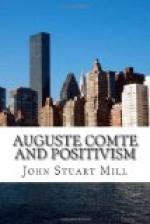It is no exaggeration to say, that M. Comte gradually acquired a real hatred for scientific and all purely intellectual pursuits, and was bent on retaining no more of them than was strictly indispensable. The greatest of his anxieties is lest people should reason, and seek to know, more than enough. He regards all abstraction and all reasoning as morally dangerous, by developing an inordinate pride (orgueil), and still more, by producing dryness (scheresse). Abstract thought, he says, is not a wholesome occupation for more than a small number of human beings, nor of them for more than a small part of their time. Art, which calls the emotions into play along with and more than the reason, is the only intellectual exercise really adapted to human nature. It is nevertheless indispensable that the chief theories of the various abstract sciences, together with the modes in which those theories were historically and logically arrived at, should form a part of universal education: for, first, it is only thus that the methods can be learnt, by which to attain the results sought by the moral and social sciences: though we cannot perceive that M. Comte got at his own moral and social results by those processes. Secondly, the principal truths of the subordinate sciences are necessary to the systematization (still systematization!) of our conceptions, by binding together our notions of the world in a set of propositions, which are coherent, and are a sufficiently correct representation of fact for our practical wants. Thirdly, a familiar knowledge of the invariable laws of natural phaenomena is a great elementary lesson of submission, which, he is never weary of saying, is the first condition both of morality and of happiness. For these




